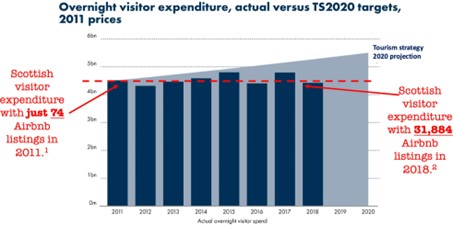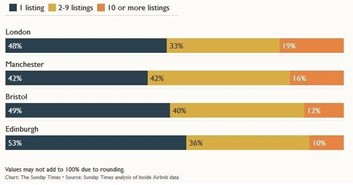-
Why is this legislation so important?
It is a government’s first responsibility is to ensure that everyone has a decent home that they can afford to live in. In Scotland there are serious problems in areas where the high demand for housing is impacted by concentrations of more lucrative Airbnb-type lets.
In areas such as Edinburgh, Glasgow, Highlands and Islands, ordinary people are finding themselves simply unable to find a home. Public services and businesses are unable to recruit and retain staff due to a lack of available housing.
The impact of short-term lets on the availability and cost of housing was seen very clearly during lockdown. In Edinburgh, there was the first fall in annual average rents since 20091 as the market was flooded with Airbnb flats.
-
Why is this delay unacceptable?
- PLACE wrote to MSPs on 16th November 2021 and asked you to resist lobbying and to prevent any more delays. Here we are in 2023 asking you to resist lobbying and yet another delay.
- The concern is misplaced – Those most affected by the cost-of-living crisis are not short-term letting hosts. Similar dispensations are not being made to other licensed businesses so why are STL owners being singled out for this benefit?Properties that are not authorised for short-term letting can still be used to generate income, by using these as a long-term let, and increasing the supply of homes.
- The delay will worsen the cost of living crisis for those most at risk. The impending legislation was already noticeably increasing the availability, affordability and livability of housing as investors sold off their stock in advance of the impending implementation date. These sales have stopped overnight as investors are gifted with another season of short-term letting income, particularly in Edinburgh.
- Poor tourist accommodation will be unsafe and unlawful for longer – We have reviewed the Guidance for Hosts and Operators and are at a loss to understand why additional time is needed. We were assured by the industry that every responsible operator in Scotland would already have these safeguards in place.
- This gives more time to dangerous and unlawful operators – There are a significant number of unlawful operators who will not and cannot meet these rules. Those operating unlawfully in Edinburgh tenements is a key example of this. For them, a delay is as good as a win, at the expense of communities.
- More homes will be lost – More commercial STL businesses operating without permission in homes will gain immunity from planning enforcement as they become eligible for the 10 year rule if this delay is authorised.
-
Have we seen any economic benefits from the exponential increase in short-term lets?
- There has been zero growth in the Scottish tourist economy since 2011. Despite an exponential increase in the number of Airbnb properties from 74 in 2011 to 31,884 in 2019, there has been zero growth in the Scottish Tourism Economy.2

- Beneficiaries of short-term letting are disproportionately high-wealth individuals – The Economic Policy Institute3 finds that the economic costs imposed by short-term letting likely outweigh the benefits. Property owners may benefit but the beneficiaries are disproportionately high-wealth individuals who can own more than one property. The graph below shows a Sunday Times investigation which finds 47% of Edinburgh listings are held by hosts with more than one listing.

- There has been zero growth in the Scottish tourist economy since 2011. Despite an exponential increase in the number of Airbnb properties from 74 in 2011 to 31,884 in 2019, there has been zero growth in the Scottish Tourism Economy.2
-
Could there be misinformation by bad actors to protect their profits?
- Exaggeration of costs – Companies like Airbnb are spending huge amounts of money to tell their hosts that licensing could be more than £700 and planning permission will cost up to £4,000 (it is £401 for every business that pays it).4
- Misrepresentation of licensing aims by short-term letting companies who profit from operating in residential tenements – Operating a short-term let in a tenement is usually a change of use and requires planning permission. Permission is rarely granted due to the impact on security and disturbances. Many hosts ignore these rules and operate in tenements regardless. Licensing will hold these bad actors to account and will deny them a licence. We believe there is significant work by some companies who operate largely in Edinburgh tenements to misrepresent the aims and the impact of licensing to drum up support against what is a reasonable scheme.
- This is “a ban on short-term letting” – It isn’t. It is a simple, commonplace, 3 year licence which requires providers to confirm simple safety precautions and planning lawfulness to protect communities and visitors. We expect most businesses (excluding bad actors that are already in breach of planning regulations) to be able to continue, if they can demonstrate health and safety compliance.
- The Edinburgh Festival and Fringe will die – The Festivals operated long before Airbnb. These Festivals were most affordable without it. 2022 was meant to be the last year without licensing and it was the least affordable so far. The Edinburgh Festivals are a wonderful thing, however it is a fact that they have catalysed the mass conversion of Edinburgh’s housing stock to high profit short-term lets. The aims of a great Festival and the aims of this city must align. We advocate for a Festival which is more fair, sustainable, affordable, inclusive and better for artists, residents and audiences. Not just bigger. We can do, and need to do better.
We write to implore the government to protect the existing deadlines to implement this important legislation which supports the right to adequate housing and resists the financialisation of essential housing stock.
PLACE
@PLACEEdinburgh
- https://www.rettie.co.uk/articles/edinburghs-rental-market-response-to-covid-lettings-market-briefing-feb-2021
- https://spice-spotlight.scot/2019/07/30/a-tourism-target-too-far/
- https://www.epi.org/publication/the-economic-costs-and-benefits-of-airbnb-no-reason-for-local-policymakers-to-let-airbnb-bypass-tax-or-regulatory-obligations/
- https://twitter.com/PLACEEdinburgh/status/1335547621012811779/photo/1
